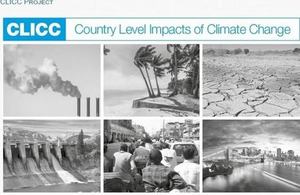Russia helps to lead the way on communicating climate change impacts
Scientists from Russia and the UK discussed the impacts and risks of climate change at a round table event held on 24 November at the British Ambassador’s Residence in Moscow.

The event was organised by British company, Ricardo Energy and Environment in collaboration with the Institute of Global Climate and Ecology (IGCE) of Roshydromet and Russian Academy of Sciences. The event was attended by Sir David King, UK Foreign and Commonwealth Office (FCO) special representative for climate change.
The focus of this event was to facilitate the exchange of knowledge on climate impacts and their magnitude.
-
Sir David King highlighted the urgency of addressing climate change and discussed the potential economic benefits from early action. He gave the example of the clean energy sector in the UK which is the fastest growing sector of the economy.
-
The discussion highlighted the challenges of assessing climate change across a geographic region as large as Russia, with positive and negative impacts occurring at regional and local levels.
-
The importance of making assessments on the basis of reliable data was discussed, as well as incorporating economic, social, and environmental assessments.
-
It was also noted that in attempting to arrive at a common understanding of climate risk, all the stakeholders involved need to communicate using a common terminology.
The round table was organised as part of the UK FCO funded project “Assessing and communicating country level climate impacts in Russia and the UK”. The results from this project will feed into the overarching initiative Country Level Impacts of Climate Change (CLICC) in which Russia played an important role by undertaking a CLICC pilot in 2015-16 along with 5 other countries from around the world (China, Vietnam, Ghana, Fiji and the UK).
Russia is helping to lead the way on climate impacts as the results of the current FCO funded Russia-UK project will feed into the wider CLICC initiative and the preparations for a second round of CLICC pilots that will be coordinated by UNEP in 2017.
This Round table is part of an FCO funded Russia-UK collaborative project “Assessing and communicating country level climate impacts in Russia and the UK”. The project will develop and apply improved approaches for the assessment and synthesis of climate impacts at a national level in both countries to enable more consistent and transparent communication of key impacts and raise awareness of these among national and international stakeholders. For this project, Russia will focus on assessing the magnitude of climate impacts on Permafrost; the UK will look at how this approach links with the assessment of the magnitude of climate impacts on flooding. The project runs from September 2016 to March 2017.
This project follows on from the CLICC project initially funded by UK government and now being taken forward by UNEP. CLICC website
What is CLICC?
The CLICC Project is creating a common process to enable countries to communicate their climate impacts and vulnerabilities in a more consistent and transparent way.
Why is CLICC important? - There is currently no international process for presenting consistent information on climate change impacts at national level. This means that it is hard to compare results from different assessments and different countries, or even to attempt a synthesis at country level.
CLICC core aims are to:
-
Facilitate global understanding of country-level climate impacts to support action on climate change, by informing national mitigation and adaptation planning, and international dialogue
-
Promote good practice and collective learning in assessing climate impacts. CLICC took a different approach to other initiatives on climate impacts to ensure that the process is country driven.
CLICC Pilots - CLICC pilots were carried out in 2015/2016 by 6 countries (Russia, China, Vietnam, Ghana, Fiji and the UK) and lessons learned will be embedded in the process going forwards. UNEP are taking forward the CLICC initiative and are about to launch the second round of pilots.
The current FCO funded Russia-UK climate impacts project is continuing to develop understanding and capacity on climate impacts in Russia that started in the CLICC Russia pilot and will produce useful information to feed back into CLICC as it continues to develop under UNEP.